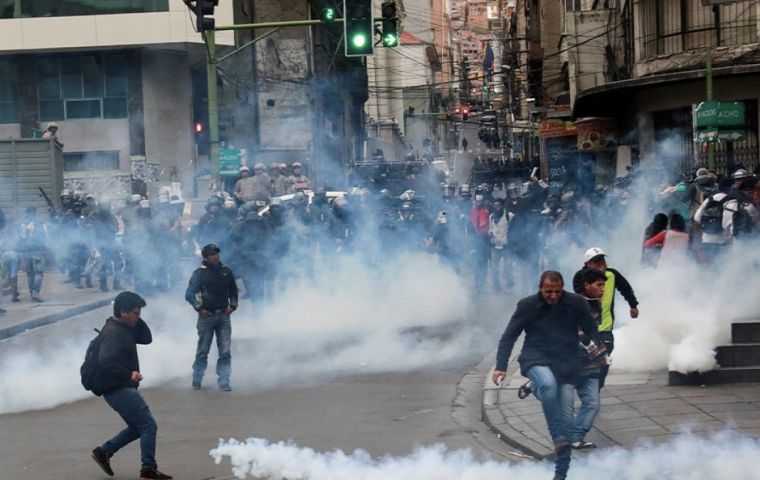MercoPress. South Atlantic News Agency
IACHR team rounds up Bolivian assignment
 The detention of Santa Cruz governor Camacho was among the subjects brought to the attention of the IACHR delegation
The detention of Santa Cruz governor Camacho was among the subjects brought to the attention of the IACHR delegation An Inter-American Commission on Human Rights (IACHR) team rounded up its mission in Bolivia on Friday after being told that the government abode by its recommendations issued after the political crisis of 2019. The visiting delegation also collected testimony from the victims claiming otherwise.
The IACHR dignitaries held meetings with officials from the Executive and the Judiciary, from the Ombudsman's office, and with victims of the Senkata massacre, or of former President Evo Morales and other political party leaders.
The Government reported progress in the fulfillment of the 36 recommendations issued by the Interdisciplinary Group of Independent Experts (GIEI).
However, the victims said there was no progress at all, according to Bolivian media.
Justice Minister Iván Lima highlighted the creation of a “follow-up table” that has been in force since March 2022 for the fulfillment of the recommendations.
He also underlined the trials against former President Jeanine Áñez, her former ministers, former military chiefs, and others involved in the so-called “coup d'état against Morales in 2019 and the decision of a judge to try Áñez for the ”Senkata massacre“ in an ordinary court without respecting her status as a former president.
Lima also referred to the summit against racism and discrimination organized by the Ministry of Cultures to eradicate the structural causes of what happened in 2019 as compliance with the recommendations of the GIEI.
The representative of the Senkata victims, David Inca, contradicted the government version during the meeting with the IACHR because the Government has no plan for reparations to the victims.
”We have responded that the Government does not have a plan. There is no comprehensive reparation plan. This plan goes through the approval of a law and a comprehensive reparation policy,“ neither of which ”has been approved to date,“ said the human rights activist. He also stated that there is no registry of victims and the case is still under investigation.
Comunidad Ciudadana leader Carlos Mesa said that they delivered a document analyzing the non-compliance with the recommendations and concluded that as long as there is no independent justice there will be no democracy. ”Since the GIEI made its report until today, the situation of justice in Bolivia is much worse. Political-judicial persecution, through the Judiciary, the Public Prosecutor's Office, and the Bolivian Police, has become commonplace,“ Mesa lamented and made two specific demands: to issue a specific report on the need for a reform that generates and guarantees the independence of the Judiciary and the modification of the typification of criminal types that are now giving rise to arbitrary persecution of opponents such as Jeanine Áñez, Luis Fernando Camacho, Marco Antonio Pumari and others.
After this visit, the IACHR is expected to issue a report on the progress made in complying with the recommendations of the GIEI-Bolivia.
Lawmakers from the Creemos alliance filed a complaint for the violation of the fundamental rights of Santa Cruz Governor Luis Fernando Camacho, who has been placed under arrest by the current government.
”We are adding this note of complaint in the IACHR portal, with the request for precautionary measures for the governor, for the constant violations to the rights not only of the governor but also now of his wife, a woman who was assaulted and restrained inside the prison of Chonchocoro,“ Congresswoman María René Álvarez explained.
The complaint also mentions the discovery by Camacho himself of a hidden camera in his cell, which constitutes ”another abuse.“
”The Political Constitution of the State of Bolivia, as well as the international instruments, include the right to privacy, and prohibit arbitrary interference in the private sphere of people,“ the note states.
”The governor is the victim of cruel and inhumane treatment by being repeatedly exposed to serious violations of his rights without the existence of mechanisms to ensure his judicial protection or adequate remedies against these attacks on his dignity and privacy,” Creemos said.




Top Comments
Disclaimer & comment rulesCommenting for this story is now closed.
If you have a Facebook account, become a fan and comment on our Facebook Page!